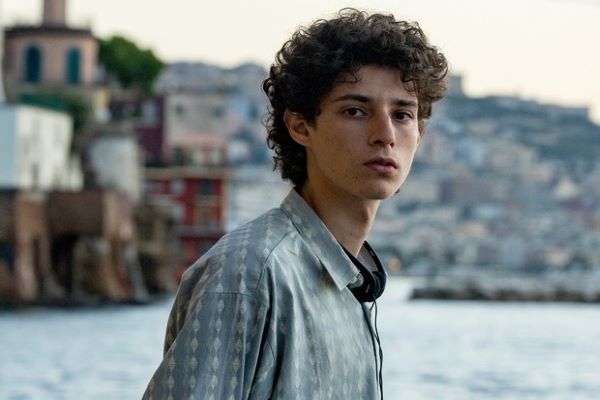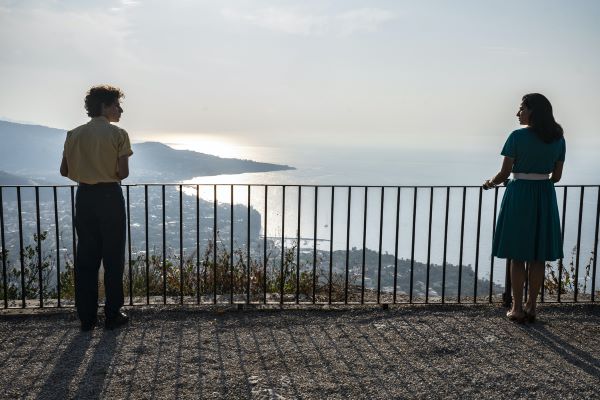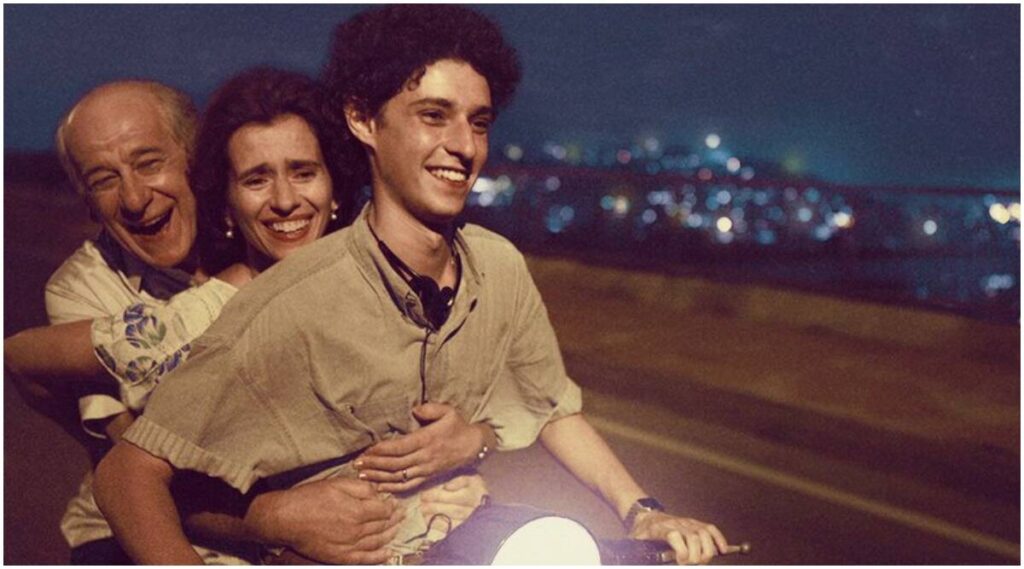Paolo Sorrentino portrays his life in his deeply personal and autobiographical film The Hand of God. The title of the film is the namesake of football legend Diego Maradona’s infamous “Hand of God” goal. The film also shows the importance and influence of Diego Maradona on Sorrentino as well as Naples. The film also depicts a divine intervention that saved Sorrentino’s life. However, it is not a film about football. The Hand of God is all about Sorrentino and his life events. The film is largely divided into three parts. The first part depicts the filmmaker’s childhood and family life. In the middle, a personal tragedy strikes hard and changes his life forever. In the last part, he searches for the passion and significance of his life.
The film starts with a spectacular aerial shot of Naples on the shore of the Gulf of Naples. Fabietto’s (Filippo Scotti) aunt Patrizia (Luisa Ranieri) receives some money from the “Old Monk” and is beaten up by her husband Franco when she returns home. Franco accuses her of prostitution. Fabietto, who is the alter ego of Sorrentino, rides a scooter with his father Saverio (Toni Servillo) and mother Maria (Teresa Saponangelo) to his Aunt Patrizia’s house to save her from being beaten up. Fabietto and his family members meet over a hilarious and grotesque lunch. After that, they go for taking dips into the sea by a boat, where Patrizia is seen naked under the sun in the boat. All the family members get embarrassed. Later, Saverio is caught having an affair with his colleague, which results in a violent fight with Maria. Fabietto is deeply shocked and shivers heavily. Marchino auditions for a Fellini film but gets rejected as the maestro thinks his face is too conventional. FCC Napoli signs the contract with Maradona, which was deemed impossible. Maradona starts scoring goals and winning matches for Napoli.

Saverio and Maria visit Roccaraso and there, they are killed in a carbon monoxide gas leakage accident. Fabietto and his elder brother Marchino (Marlon Joubert) rush to the hospital only to find out that both of their parents have died in that accident. Both of them break down, however, the dead bodies are not shown to them. All the family members and relatives visit the brothers and convey their deepest condolences. Patrizia is in a mental hospital and is not able to visit them. Fabietto befriends a cigarette smuggler named Armando and enjoys his company. After the demise of his parents, Naples no longer attracts Fabietto and he wants to pursue filmmaking in Rome. At a theatre, he meets film director Capuano by chance. He follows him and keeps insisting to be mentored by Capuano in filmmaking. Capuano asks him whether he has his own voice. Fabietto affirms that he has his own voice. Finally, he boards the train to Rome and leaves Naples permanently.
Writing an autobiography or making an autobiographical film is not an easy job. Revealing one’s life to the entire world sometimes may be embarrassing. All artists are deeply impacted by their lives and their life events are reflected in their works. Memories and nostalgia strongly impact filmmakers and their films. Similarly, Sorrentino’s life has been deeply impacted by his childhood and adolescence spent in Naples. He was an introverted boy with practically no friends. His childhood days were spent in a grotesque but very well-connected family. Those days were full of happiness and rejoicing. He was extremely close to his parents and brother and had infatuation and deep sympathy for his voluptuous aunt Patrizia. His cheerful and colorful life took a U-turn when he lost both of his parents in the accident. Suddenly, his cheerful adolescent life took the shape of vulnerable adult life. This is the time when he contemplated life seriously and wanted to be a filmmaker. The tragedy shook him very badly and Naples was no longer attractive to him. He got assistance and inspiration from Capuano to commence his filmmaking journey. The title The Hand of God also has relevance in Sorrentino’s life. Had he not visited the stadium to see Maradona play, he would have gone to Roccaraso with his parents and died there. So, it is almighty who saved him. As per uncle Alfredo, Maradona is an angel and saved him. The unmatchable hysteria Maradona created on Naples as well as the world can never be forgotten. In this film, Sorrentino shows the importance and influence of Maradona and divine intervention in his life.

The Hand of God is like a poem that Sorrentino created through the camera of cinematographer Daria D’Antonio. It is a very beautiful and extremely well-made film. The entire film is filled with magnificent picturesque shots of Naples and the Gulf of Naples in the morning, daytime, evening, and night. Sorrentino brilliantly captures the life and rhythm of Naples and its people. He also shows how soccer and especially Maradona influenced the lives of Neapolitans in the 1980s. The first half of the film is vivacious but the second half is mostly tragic and restrained. Apart from a few melancholy background scores, music is mostly subdued in the film. However, Sorrentino used the famous Napule E song by Pino Daniele at the last when the credit rolls. Filippo Scotti as Fabietto is sensitive, calm, composed, and more mature than his age. Toni Servillo and Teresa Saponangelo are spontaneous and brilliant. Luisa Ranieri as Patrizia is seductive but also draws sympathy as a mental patient. The Hand of God was screened in competition for the coveted Golden Lion award where it won the Grand Jury Prize and Filippo Scotti won the Marcello Mastroianni Award. The film has been selected as the Italian entry for the Best International Feature Film at the 94th Academy Awards.
